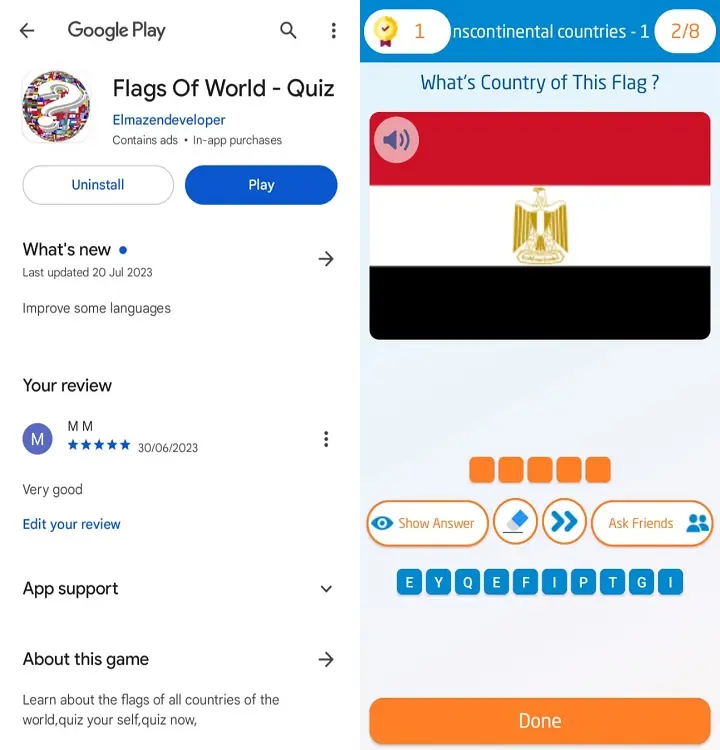Flag of Egypt, Population, Currency, Borders
Exploring Egypt : Flag, Population, Currency, Borders, Culture, Tourist Places
Exploring Egypt: A Land of History and Wonders
Egypt is a fascinating country that bridges the continents of Africa and Asia, offering a rich blend of history, culture, and natural beauty.
Whether you’re planning a visit or simply looking to learn more, here’s an in-depth look at this extraordinary nation.
Flag of Egypt

Download the application  Flags Of World - Quiz ,
Flags Of World - Quiz ,
And test your knowledge with Flags of World ,
1. Population of Egypt
As of December 2024, Egypt has a population of approximately 117.38 million people, making it the most populous country in the Arab world and the third most populous in Africa.
The majority of the population resides along the fertile banks of the Nile River, with major urban centers like Cairo and Alexandria serving as cultural and economic hubs.
2. Meaning Behind Egypt’s Flag
The national flag of Egypt features three horizontal stripes of red, white, and black, with the Eagle of Saladin centered in the white stripe:
- Red symbolizes the struggle for independence and the sacrifices made in Egypt’s history.
- White represents the peaceful nature of Egypt’s revolution.
- Black signifies the end of oppression.
The eagle is a symbol of strength, power, and resilience, reflecting Egypt’s historical and contemporary importance.
3. Currency of Egypt
Egypt’s official currency is the Egyptian Pound (EGP), often abbreviated as £ or LE (from the French term "livre égyptienne").
The currency is used widely across the country, with coins and banknotes available for transactions.
Flag of Egypt

Download the application  Flags Of World - Quiz ,
Flags Of World - Quiz ,
And test your knowledge with Flags of World ,
4. Egypt’s Borders
Egypt is strategically located in northeastern Africa and shares borders with several countries:
- Libya to the west
- Sudan to the south
- Palestine ( Gaza Strip ) and Israel to the northeast Additionally, Egypt is bordered by the Mediterranean Sea to the north and the Red Sea to the east.
The Suez Canal, one of the world’s most significant waterways, connects the Mediterranean and Red Seas.
5. Culture of Egypt
Egyptian culture is a harmonious blend of ancient traditions and modern influences:
- History and Heritage: Egypt’s civilization dates back thousands of years, with its pharaohs, pyramids, and temples leaving an indelible mark on world history.
- Religion: Islam is the dominant religion, with Christianity also practiced by a significant minority.
- Language: Arabic is the official language, though many Egyptians also speak English and French.
- Cuisine: Egyptian food is hearty and flavorful, with dishes like koshari, falafel, and molokhia being staples.
- Arts: From traditional music and dance to modern cinema and literature, Egypt has a thriving cultural scene.
6. Best Places to Visit in Egypt
Egypt offers a variety of attractions that cater to history buffs, nature lovers, and adventure seekers alike:
Pyramids of Giza:
These iconic ancient wonders are a must-see for anyone visiting Egypt.
Luxor and Karnak Temples:
Located in the city of Luxor, these temples showcase the grandeur of ancient Egyptian architecture.
Valley of the Kings:
The burial site of many pharaohs, including Tutankhamun, is a treasure trove of history.
Aswan and Abu Simbel:
Known for their stunning temples and serene Nile views.
Cairo:
Egypt’s bustling capital is home to the Egyptian Museum and the vibrant Khan el-Khalili bazaar.
Red Sea Resorts:
Sharm El Sheikh and Hurghada are famous for their crystal-clear waters and vibrant coral reefs, perfect for diving and snorkeling.
Siwa Oasis:
A hidden gem in the Western Desert, offering tranquility and natural beauty.
Egypt is a country that has something for everyone, from its awe-inspiring historical landmarks to its warm and welcoming culture.
Whether you’re drawn by the mysteries of the pyramids, the allure of the Nile, or the vibrant modern cities, Egypt is a destination that promises unforgettable experiences.
Flag of Egypt
